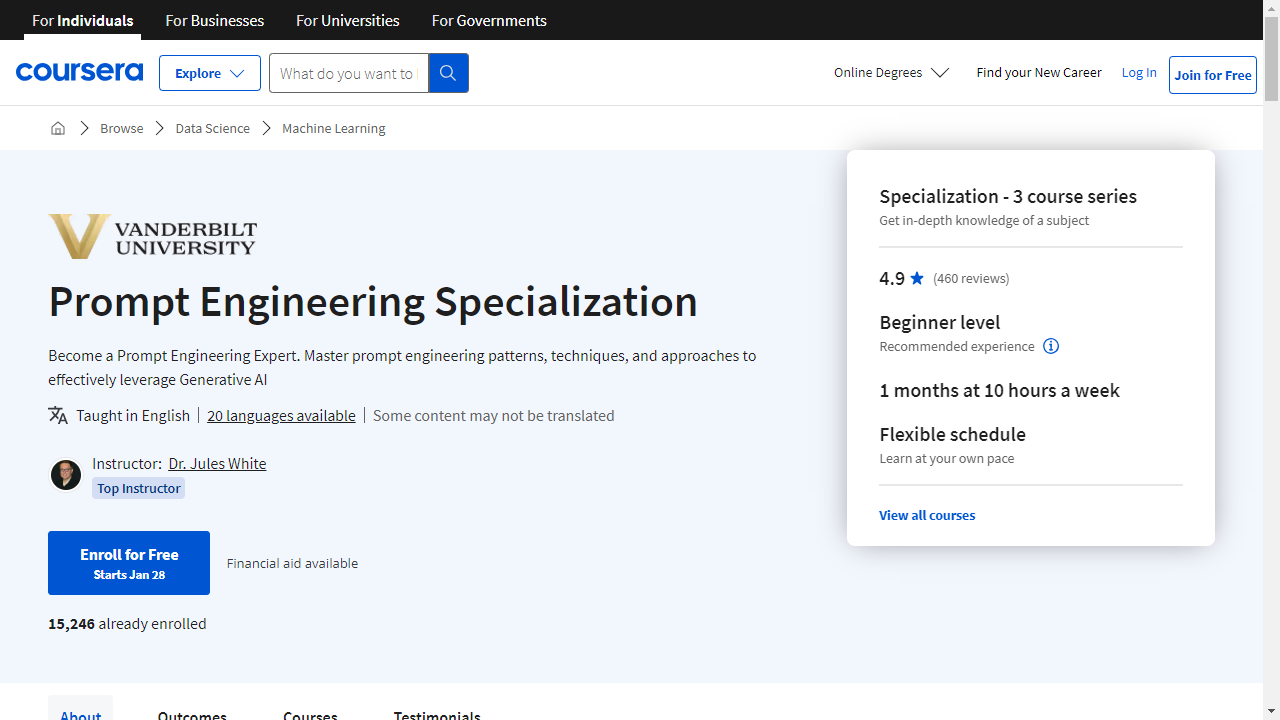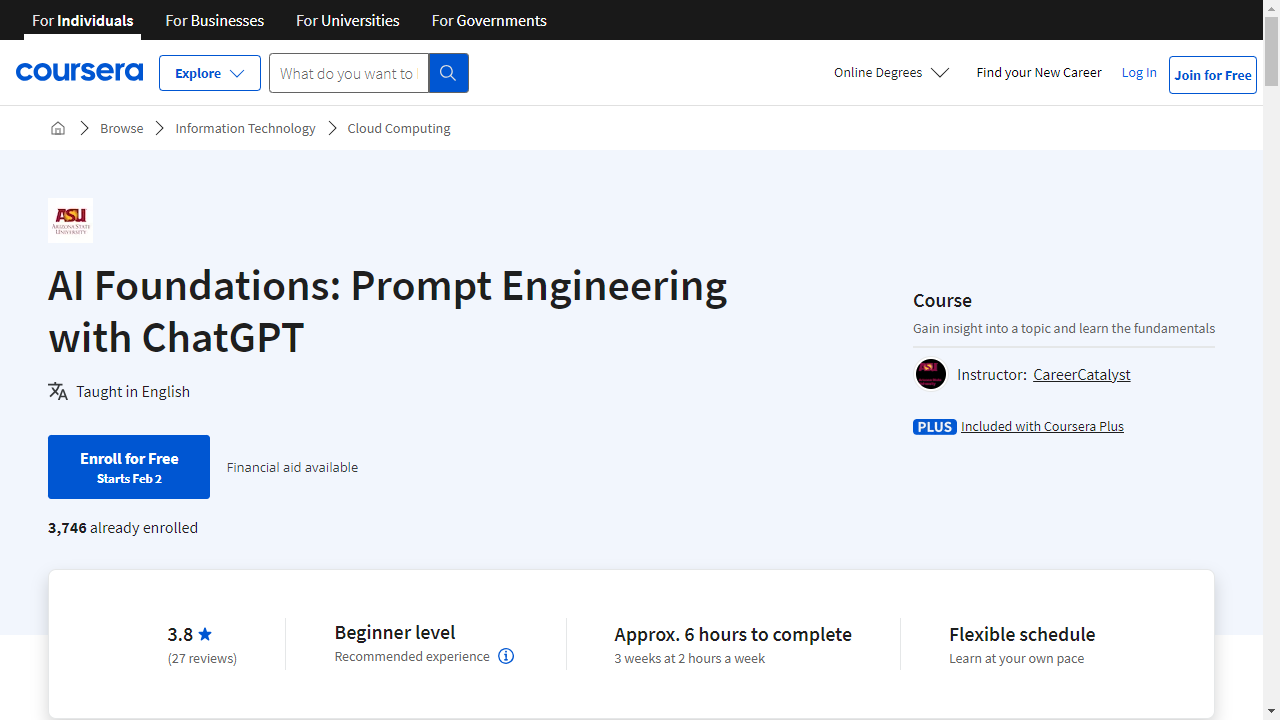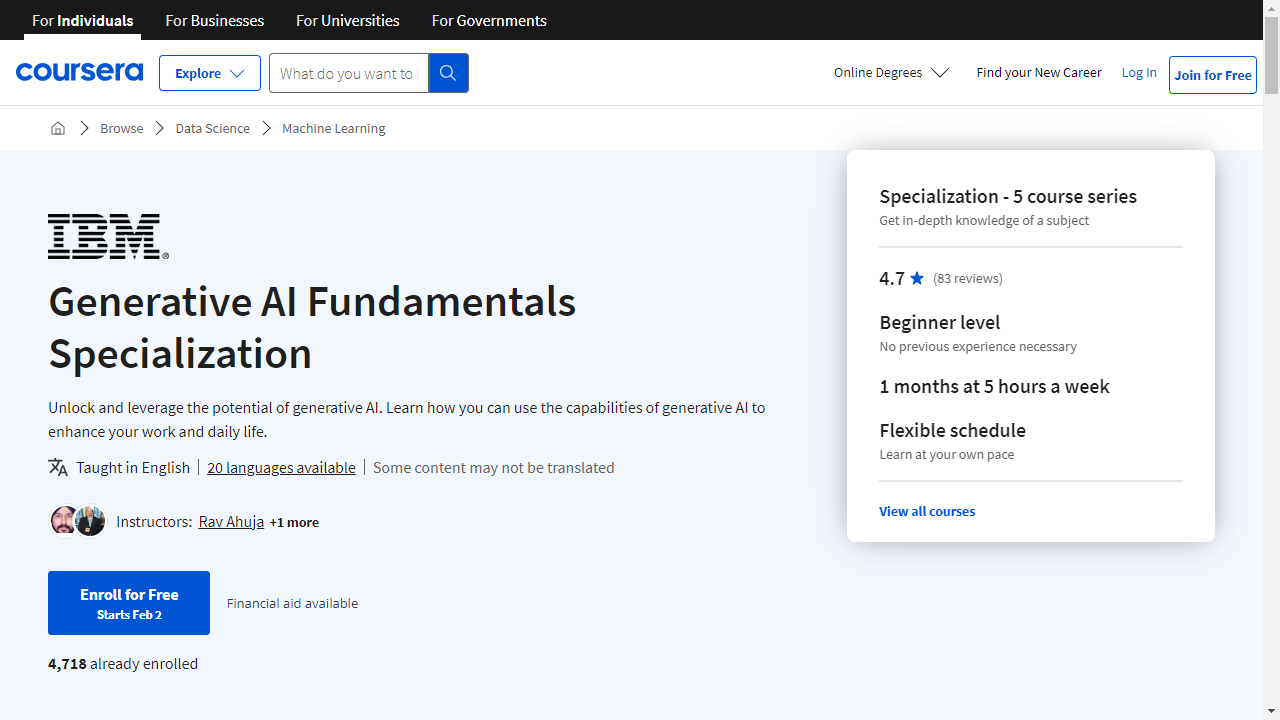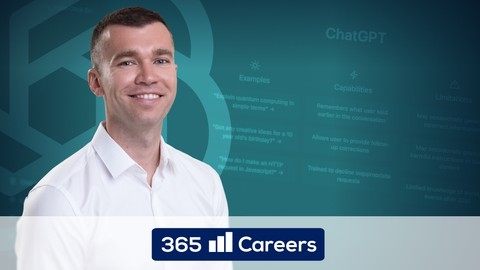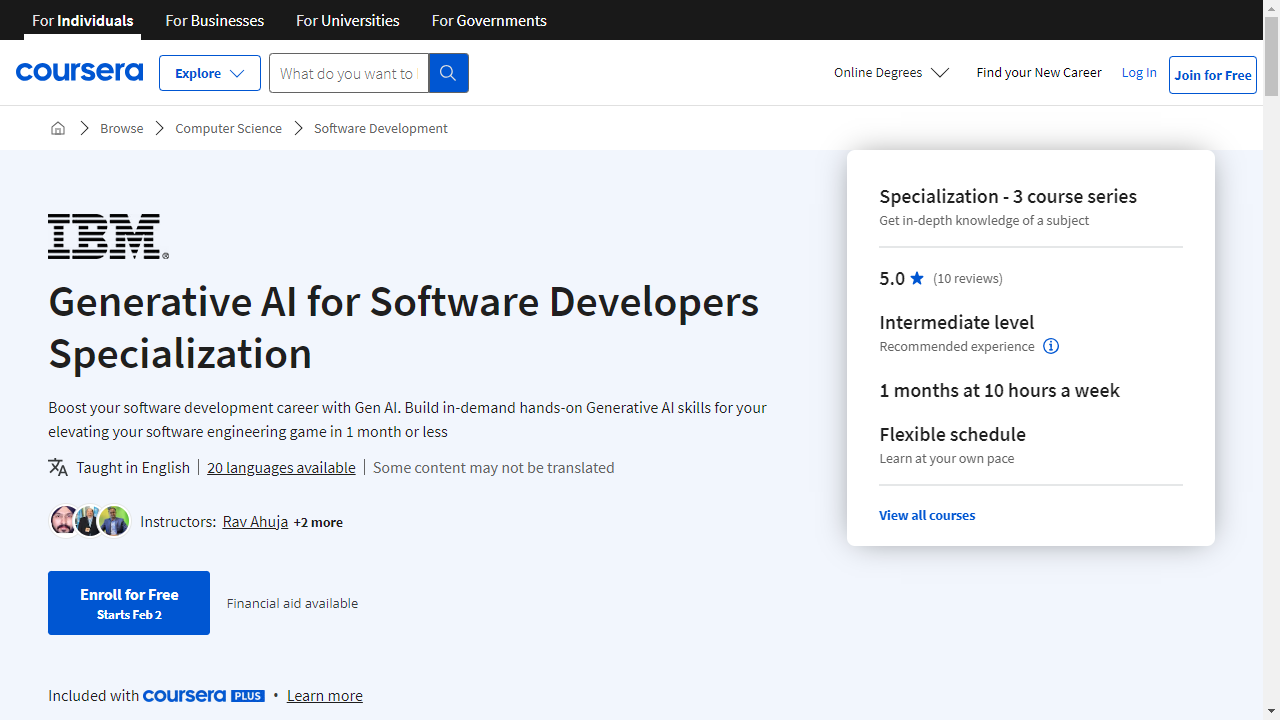Generative AI is revolutionizing the way we create and interact with content.
This rapidly evolving field uses artificial intelligence to generate text, images, music, and even code.
By learning generative AI, you can unlock powerful tools to enhance your creative process, automate tasks, and explore new frontiers in content creation.
Whether you’re a writer, artist, developer, or simply curious about the future of technology, understanding generative AI can open up exciting opportunities.
Finding the right course to guide you through the intricacies of generative AI can be a challenge.
With numerous options available, you need a course that provides a strong foundation, practical applications, and insights into the latest advancements in the field.
You want a course that not only explains the concepts but also empowers you to use generative AI tools effectively.
Based on our research, How to use ChatGPT and Generative AI to help create content on Udemy stands out as the best overall course for learning generative AI.
This course provides a comprehensive introduction to the field, covering key concepts, popular tools like Midjourney and ChatGPT, and practical applications in content creation.
It offers a balance of theory and hands-on exercises, making it suitable for both beginners and those with some AI experience.
However, the ideal course for you depends on your specific needs and learning preferences.
We’ve compiled a list of other excellent generative AI courses covering various platforms, specializations, and skill levels.
Continue reading to discover the perfect course to ignite your generative AI journey.
How to use ChatGPT and Generative AI to help create content
Provider: Udemy
This Udemy course on ChatGPT and Generative AI will teach you how to use these powerful tools to become a better content creator.
You’ll begin with a solid foundation in Generative AI, learning its definition, uses, and the different types.
The course then dives into the exciting world of image generation, showing you how to use tools like Midjourney, Stable Diffusion, and DALL-E to create stunning visuals from text descriptions.
You’ll then explore the fascinating world of Large Language Models (LLMs) like ChatGPT and Gemini.
This course demystifies the technology behind these models, like transformers, and teaches you how to effectively communicate with them through prompt engineering techniques.
You’ll learn different prompting methods like Zero-Shot, Few-Shot, and Priming, giving you the ability to generate diverse content from these models.
The course uses practical examples and case studies like Buzzfeed’s use of ChatGPT to demonstrate the real-world applications of these technologies.
You will explore a range of tasks you can perform with generative AI, from creating compelling marketing copy and summarizing lengthy documents to even writing code.
The course guides you through using the OpenAI API to build your own AI applications, opening up a world of possibilities for custom generative AI solutions.
You will learn to differentiate between various models, including ChatGPT 3.5 and 4, and discover the strengths of each.
The course even delves into advanced concepts like fine-tuning GPT 3.5 and using the Gemini API in Google AI Studio, providing you with a glimpse into the cutting-edge of generative AI.
Prompt Engineering Specialization
Provider: Coursera
This specialization teaches you how to use ChatGPT and other large language models to enhance your work and personal life.
You’ll start by learning prompt engineering, a skill that helps you communicate effectively with these powerful tools.
You will move from basic prompts to sophisticated ones, learning techniques like “chain of thought prompting,” which helps ChatGPT solve complex problems.
The specialization then explores using ChatGPT for advanced data analysis.
You can learn how to transform data from spreadsheets into PowerPoint presentations and extract insights from PDFs.
This course reveals the potential of ChatGPT to automate tasks, increasing your efficiency in various tasks.
Finally, you will learn how to use these tools responsibly and ethically.
You will understand how to identify suitable problems for generative AI, assess the trustworthiness of outputs, and avoid potential pitfalls like “hallucination” (when AI generates inaccurate information).
You will discover how to frame problems effectively, validate results, and leverage generative AI for creative tasks, augmenting your existing skills rather than replacing them.
Machine Learning, Data Science and Generative AI with Python
Provider: Udemy
This course takes you on a fascinating journey into the world of machine learning, data science, and generative AI.
You’ll start with Python basics, ensuring you have the tools to handle complex data.
Don’t worry if statistics isn’t your forte; the course refreshes essential statistical concepts and guides you through their application in Python.
You’ll quickly transition to building predictive models, using techniques like linear and polynomial regression to forecast real-world outcomes like car prices.
You’ll explore the exciting world of machine learning, where you’ll learn to create a spam classifier, group individuals based on demographics, and even predict hiring decisions—all using real-world datasets.
You’ll then dive into the fascinating world of deep learning, using libraries like TensorFlow and Keras to build powerful models for image recognition and sentiment analysis.
You’ll explore how convolutional neural networks excel at image processing and how recurrent neural networks can analyze sequences of data like text.
The course then ventures into the cutting-edge realm of generative AI.
You’ll learn how to create synthetic images and data using variational autoencoders and generative adversarial networks.
Finally, you’ll unlock the power of transformers, the architecture behind GPT and ChatGPT.
You’ll learn how these models utilize self-attention to understand and generate human-like text.
You’ll even get to experiment with OpenAI’s API, creating conversations with ChatGPT, generating images using DALL-E, and much more.
AI Foundations: Prompt Engineering with ChatGPT
Provider: Coursera
This course teaches you how to effectively use ChatGPT, a popular AI tool.
You begin with an introduction to AI Foundations and learn to navigate the RACCCA framework, which helps you understand ChatGPT’s capabilities.
You quickly discover the importance of Prompt Engineering, learning how to ask the right questions to get optimal results from ChatGPT.
The course guides you in crafting various types of prompts, from simple to complex.
You explore techniques like Imaginative Prompt Engineering, pushing the boundaries of ChatGPT’s potential.
You learn to create prompts for specific tasks, like writing different types of creative content or even translating languages.
The course also touches on the potential downsides of AI, such as bias and ethical concerns.
You discover how to craft prompts that are effective, safe, and aligned with ethical considerations.
This course equips you with the skills to use ChatGPT for a variety of purposes, including generating marketing copy, composing different types of written content, and even coding.
You will craft effective prompts, explore the creative potential of AI, and understand the responsible use of this technology.
ChatGPT Complete Guide: Learn Midjourney, ChatGPT 4 & More
Provider: Udemy
This course plunges into the heart of AI tools, teaching you how to wield them for various tasks, from creating art and writing compelling content to generating code and even designing your own AI assistants.
You’ll begin by mastering the fundamentals of ChatGPT, from understanding its interface and harnessing prompt engineering techniques to unlocking advanced features like custom instructions and plugins.
You’ll discover how to simplify complex information with ChatGPT, write various types of copy, and even streamline your research and job preparation processes.
The course then guides you through the world of Midjourney, teaching you how to create stunning digital art using different styles and techniques.
You’ll become adept at crafting effective prompts, editing images, and even producing professional-looking product photography, landing pages, and image blends.
The course also explores other key players in the field such as Bing, Google Bard, Adobe Firefly, and DALL-E 2, equipping you with the knowledge and skills to leverage these powerful tools for AI-powered search, text generation, image creation, and more.
You won’t just be learning about the big names - the course also delves into a variety of other useful AI tools like Notion AI, Zapier, and several others specializing in writing, voice cloning, photo editing, video creation, and even music composition.
These tools will become your allies as you learn to optimize your workflows, automate tasks, and push the boundaries of your creativity.
Finally, you’ll gain valuable insights into the future of AI from expert guest speakers.
Generative AI for Everyone Specialization
Provider: Coursera
You’ll begin by understanding the basics of generative AI, like how it’s different from discriminative AI.
You’ll also discover its real-world applications, such as generating text, images, and code.
You’ll become familiar with popular models like GPT, DALL-E, and Stable Diffusion and even get to experiment with tools like ChatGPT.
Next, you’ll master prompt engineering, a crucial skill for maximizing the potential of generative AI tools.
You’ll learn techniques like zero-shot and few-shot prompting and approaches like Interview Pattern, Chain-of-Thought, and Tree-of-Thought.
The specialization also introduces you to tools like IBM watsonx Prompt Lab and Spellbook, helping you craft effective prompts.
You’ll then delve into the core models and platforms driving generative AI, including deep learning, LLMs, and foundation models.
You’ll explore models such as GANs, VAEs, transformers, and diffusion models.
Plus, you’ll become familiar with pre-trained models and platforms like IBM watsonx and Hugging Face, understanding their use in building AI applications.
The ethical considerations surrounding generative AI are also addressed.
You’ll examine data privacy and security concerns, copyright infringement, potential bias in AI outputs, and the impact on the workforce.
You’ll also learn about the responsible development and use of this technology, ensuring you can navigate the ethical considerations surrounding generative AI.
Finally, you’ll explore the future of generative AI and its potential career implications.
You’ll learn about emerging job opportunities in the field and understand how this technology can enhance existing roles.
Intro to ChatGPT and Generative AI
Provider: Udemy
You’ll begin by understanding why ChatGPT is so popular.
The course explains what ChatGPT is, how it’s different from other AI systems, and the technology behind it, including AI, NLP, and LLMs.
You’ll also discover various types of AI, including notable projects like TensorFlow and Pytorch.
Next, you’ll learn how to sign up for ChatGPT and create effective prompts, a crucial skill in using these tools.
The course dives into prompt engineering, teaching you how to ask better questions and get better responses.
You’ll learn important commands like “Rename,” “Share,” and “Delete” to manage your ChatGPT conversations effectively.
Additionally, you’ll learn how to adjust settings and create instructions for future conversations.
The course then shifts to practical applications, showing you how to work with files and external resources in ChatGPT.
You’ll discover how to split and merge PDFs, generate training data, and even use ChatGPT as an Excel tutor.
You’ll explore how AI works with images, from comprehension to generation and editing.
Finally, the course delves into the ethical considerations of AI, discussing AI hallucinations and why embracing AI is essential.
You’ll also learn how to connect to the Open AI API, opening up even more possibilities for using AI.
Generative AI for Software Developers Specialization
Provider: Coursera
This IBM specialization equips you with the skills to integrate AI into your software development process.
You begin with “Generative AI: Introduction and Applications,” covering the basics of generative AI and its applications across various domains.
You explore models like GPT, DALL-E, and Stable Diffusion, and gain practical experience using ChatGPT.
Next, “Generative AI: Prompt Engineering Basics” delves into crafting effective prompts for optimal results.
You learn techniques like zero-shot and few-shot prompting, alongside approaches like Interview Pattern and Chain-of-Thought.
Tools like IBM watsonx Prompt Lab and Spellbook are introduced to refine your prompting skills.
Finally, “Generative AI: Elevate Your Software Development Career” focuses on applying generative AI to real-world software development.
You leverage models like ChatGPT, GitHub CoPilot, Google Gemini, and IBM watsonx Code Assistant for tasks like code generation, application design, bug detection, and code optimization.
This course also addresses the ethical considerations surrounding AI in software development, preparing you to use these powerful tools responsibly.
Also check our posts on:


